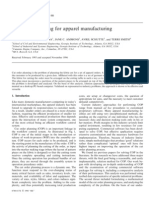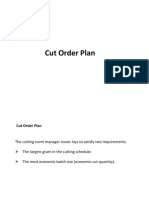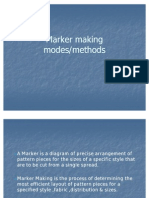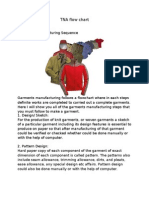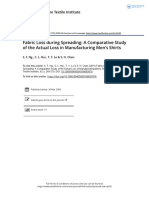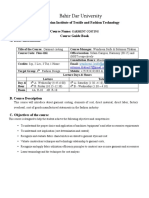100%(1)100% found this document useful (1 vote)
655 viewsCut Order Planning
Cut Order Planning
Uploaded by
arunkadveCut order planning involves planning cutting instructions as input for the marker making stage so that the cutting room receives complete instructions. It is a dynamic process that must respond to changing factors like sales, inventory, materials, and labor availability. Current approaches range from manual to customized software. CAD/CAM systems allow adjustments to be made quickly and minimize waste, reducing costs and speeding production. To calculate size-wise cutting quantities for an order, the total order quantity is divided by the sum of the size ratios and multiplied by the ratio for each individual size.
Copyright:
© All Rights Reserved
Available Formats
Download as DOCX, PDF, TXT or read online from Scribd
Cut Order Planning
Cut Order Planning
Uploaded by
arunkadve100%(1)100% found this document useful (1 vote)
655 views2 pagesCut order planning involves planning cutting instructions as input for the marker making stage so that the cutting room receives complete instructions. It is a dynamic process that must respond to changing factors like sales, inventory, materials, and labor availability. Current approaches range from manual to customized software. CAD/CAM systems allow adjustments to be made quickly and minimize waste, reducing costs and speeding production. To calculate size-wise cutting quantities for an order, the total order quantity is divided by the sum of the size ratios and multiplied by the ratio for each individual size.
Original Description:
Cut Order Planning
Copyright
© © All Rights Reserved
Available Formats
DOCX, PDF, TXT or read online from Scribd
Share this document
Did you find this document useful?
Is this content inappropriate?
Cut order planning involves planning cutting instructions as input for the marker making stage so that the cutting room receives complete instructions. It is a dynamic process that must respond to changing factors like sales, inventory, materials, and labor availability. Current approaches range from manual to customized software. CAD/CAM systems allow adjustments to be made quickly and minimize waste, reducing costs and speeding production. To calculate size-wise cutting quantities for an order, the total order quantity is divided by the sum of the size ratios and multiplied by the ratio for each individual size.
Copyright:
© All Rights Reserved
Available Formats
Download as DOCX, PDF, TXT or read online from Scribd
Download as docx, pdf, or txt
100%(1)100% found this document useful (1 vote)
655 views2 pagesCut Order Planning
Cut Order Planning
Uploaded by
arunkadveCut order planning involves planning cutting instructions as input for the marker making stage so that the cutting room receives complete instructions. It is a dynamic process that must respond to changing factors like sales, inventory, materials, and labor availability. Current approaches range from manual to customized software. CAD/CAM systems allow adjustments to be made quickly and minimize waste, reducing costs and speeding production. To calculate size-wise cutting quantities for an order, the total order quantity is divided by the sum of the size ratios and multiplied by the ratio for each individual size.
Copyright:
© All Rights Reserved
Available Formats
Download as DOCX, PDF, TXT or read online from Scribd
Download as docx, pdf, or txt
You are on page 1of 2
Cut order planning
Cut order planning is the activity of planning the order for
cutting, as an input into the marker making stage so that the cutting room
receives complete spreading and cutting instructions. The cut order
planning process is a dynamic function that must respond to the ever changing status of many critical factors such as sales, inventory levels,
raw materials, and availability of labour and equipment. The variety of
sizes, styles, fabrics and colours induces significant complexity into the
problem.
The cutting room has a greater effect on excessive manufacturing costs
than any other department concerned with the actual production of
garments. Current industry approaches for performing cut order planning
range from manual ad hoc procedures to customized proprietary software.
Today it is advisable to use CAD/CAM systems wherever it is economically
justified. Handmade markers are time consuming, and if you change your
mind about the layout you have to start over from the beginning. Making
patterns on a CAD system allows very precise drafting and measurements.
But the real advantage is that each pattern is stored on the computer and
adjustments can be made very quickly and easily. CAD systems allow the
marker maker to play with the pieces until it gets a good layout that
minimizes waste. Reduced labour costs and faster production are the
benefits.
Example
How to calculate size wise cutting quantity for 10000 pieces?
For example, suppose we have received a production order of 10000
pieces and the order size ratio is S:M:L:XL = 1:2:2:1.
Mathematical calculation is used to convert ratios into quantity. You can
use following steps to find size wise quantity.
Step#1. Calculate sum of all ratios. Here size ratio (1:2:2:1), 1+2+2+1
=6
Step#2. Divide total order quantity by sum of ratio (here 6)
Step#3. Multiply the result by ratio of a particular size
If we consider above data for example, size wise cutting quantity will be
Quantity in S = (10000 /6) x1 = 1666.66 = 1667
Quantity in M = (10000 /6) x2 = 3333.33 = 3333
Quantity in L = (10000 /6) x2 = 3333.33 = 3333
Quantity in XL = (10000 /6) x1 = 1666.66 = 1667
So we can write the formula as following
Quantity of a size = (order quantity X ratio of the particular size)/ (Sum of
ratio of all sizes)
The above calculation can be made easily by using excel sheet. You can
create a table with formula. Later when you get order and size ratios,
enter those on the specific cells; you will get actual cut quantity. For
reference I have shown you a simple cut order plan (for single colour) in
the following table.
Cut order plan sheet for single colour
You might also like
- Bundling and TicketingDocument21 pagesBundling and Ticketingsagar57% (7)
- Pattern Making TechniquesDocument68 pagesPattern Making Techniquesarunkadve100% (7)
- Mens Shirt Spec. SheetDocument12 pagesMens Shirt Spec. SheetarunkadveNo ratings yet
- Analysis of Garment W.R.T To Stitches and SeamsDocument10 pagesAnalysis of Garment W.R.T To Stitches and SeamsRehan Saeedi50% (2)
- Spreading ParametersDocument23 pagesSpreading ParameterssagarNo ratings yet
- Garments. Answer To The Question No: 01 Garment Production/Garment AssemblyDocument33 pagesGarments. Answer To The Question No: 01 Garment Production/Garment AssemblyMoklesur RahmanNo ratings yet
- Carr and Latham's Technology of Clothing ManufactureFrom EverandCarr and Latham's Technology of Clothing ManufactureDavid J. TylerRating: 4 out of 5 stars4/5 (1)
- TNA FormateDocument2 pagesTNA Formatearunkadve100% (1)
- Basic Bodice DraftingDocument1 pageBasic Bodice Draftingarunkadve0% (1)
- Cut Order PlanningDocument12 pagesCut Order PlanningShirisha Bala100% (3)
- SCAP Session 9 Cut Order PlanDocument30 pagesSCAP Session 9 Cut Order PlanReena VermaNo ratings yet
- Objective of Marker Planning and Marker MakingDocument4 pagesObjective of Marker Planning and Marker MakingSanthosh KannanNo ratings yet
- Technical Details of Shirt SewingDocument27 pagesTechnical Details of Shirt SewingFahima RashidNo ratings yet
- GarmentDocument11 pagesGarmentTenia AprilitaNo ratings yet
- Marker EfficiencyDocument8 pagesMarker EfficiencyMeeta Arora100% (1)
- Thread Consumption GuideDocument6 pagesThread Consumption GuideAshraf Khan01No ratings yet
- Capacity in Apparel IndustryDocument23 pagesCapacity in Apparel IndustryVishwanath KrNo ratings yet
- Practical Manual: Garment Construction Paper Iii - I Year (Voc)Document13 pagesPractical Manual: Garment Construction Paper Iii - I Year (Voc)Srini KalmulaNo ratings yet
- Quality Control of Garments Cutting SectionDocument6 pagesQuality Control of Garments Cutting Sectionarifulseu100% (2)
- Session 2 - Apparel Production SystemsDocument25 pagesSession 2 - Apparel Production SystemsPuja PrasadNo ratings yet
- Costing of Apparel ProductsDocument10 pagesCosting of Apparel ProductsAbhinav Verma100% (2)
- Line Balancing of A T-Shirt Sewing Line To Improve ProductivityDocument64 pagesLine Balancing of A T-Shirt Sewing Line To Improve Productivitymohammadnur89No ratings yet
- Fabric Spreading SlidesDocument19 pagesFabric Spreading SlidesRoshnal BluestacksNo ratings yet
- NIFT Mumbai: Spreading and Cutting of Apparel Products (SCAP) Session 1Document41 pagesNIFT Mumbai: Spreading and Cutting of Apparel Products (SCAP) Session 1dhruvkumar guptaNo ratings yet
- Production System in Garment IndustryDocument12 pagesProduction System in Garment Industryyasin husenNo ratings yet
- Marker MakingDocument12 pagesMarker MakingsachipalNo ratings yet
- Lay Planning TypesDocument1 pageLay Planning TypesGaurav Shakya100% (1)
- GMM - Fabric Cutting AssignmentDocument10 pagesGMM - Fabric Cutting AssignmentsatexNo ratings yet
- Denimfabricstextile Cottontrbrush: APPAREL PRODUCTION SYSTEMS (Wholesale Denim Fabrics in CHINA)Document6 pagesDenimfabricstextile Cottontrbrush: APPAREL PRODUCTION SYSTEMS (Wholesale Denim Fabrics in CHINA)Thamara Dananjaya GunarathnaNo ratings yet
- Page1 8Document21 pagesPage1 8Yuvraj PahujaNo ratings yet
- Productivity Improvement in Apparel Industry .PPT PesentationDocument14 pagesProductivity Improvement in Apparel Industry .PPT Pesentationsudincr100% (3)
- Assignment 1 LeanDocument23 pagesAssignment 1 Leanapoorvaraghuvanshi7No ratings yet
- Quality Control in Apparel IndustryDocument17 pagesQuality Control in Apparel Industrygayathri dinesanNo ratings yet
- SopDocument23 pagesSopAl Arafat RummanNo ratings yet
- Marker Making ModesDocument15 pagesMarker Making ModessamchikkuNo ratings yet
- TNA Flow ChartDocument4 pagesTNA Flow ChartAbhi Garg50% (2)
- Various Technique of Production in Sewing RoomDocument22 pagesVarious Technique of Production in Sewing RoomMansha sharma100% (2)
- Fabric Spreading - Types of Fabric Spreading - Requirements of Spreading ProcessDocument2 pagesFabric Spreading - Types of Fabric Spreading - Requirements of Spreading ProcessSubrata Mahapatra100% (2)
- Fabric Loss During Spreading A Comparative Study of The Actual Loss in Manufacturing Men S ShirtsDocument12 pagesFabric Loss During Spreading A Comparative Study of The Actual Loss in Manufacturing Men S Shirtsgunashekar kalluriNo ratings yet
- Course Guide Book of Garment CostingDocument5 pagesCourse Guide Book of Garment Costingwendosen seifeNo ratings yet
- Thread Consumption of A GarmentDocument4 pagesThread Consumption of A GarmentWasipfc100% (1)
- Sewing Machines Based On Bed TypeDocument5 pagesSewing Machines Based On Bed Typetamanna mainiNo ratings yet
- SCAP Session 10 Fabric LossesDocument21 pagesSCAP Session 10 Fabric LossesReena VermaNo ratings yet
- Buttonhole MachinesDocument12 pagesButtonhole Machinesskknitman100% (1)
- Module 9 - Garment Industy Plant LayoutDocument4 pagesModule 9 - Garment Industy Plant LayoutNECIE JOY LUNARIONo ratings yet
- Garment Production and Machinery EquipmentsDocument31 pagesGarment Production and Machinery EquipmentsShreya Bahl100% (1)
- Manual Cutting Machine Hand ScissorsDocument34 pagesManual Cutting Machine Hand ScissorsRICHA VERMA0% (1)
- Appc Assignment - Group DDocument8 pagesAppc Assignment - Group DAnkita SinhaNo ratings yet
- Garment Bundling & Garment Sewing and AssemblingDocument76 pagesGarment Bundling & Garment Sewing and AssemblingBijal DedhianGosarNo ratings yet
- National Institute of Fashion Technology GandhinagarDocument49 pagesNational Institute of Fashion Technology GandhinagarKartik ChopraNo ratings yet
- Cutting Processes Garment Industry EbookDocument22 pagesCutting Processes Garment Industry Ebookkarthikeyan100% (1)
- Cost Control Apparel IndustryDocument20 pagesCost Control Apparel IndustryjitinsharmanewNo ratings yet
- Sewing ProbDocument18 pagesSewing ProbAminur RahmanNo ratings yet
- Whole Garment Production SystemDocument61 pagesWhole Garment Production SystemKriti Singh50% (4)
- Fabric Spreading: Presented by - Abhishek Pandey - Ankita Chandel - Mulugeta - Palak SalujaDocument23 pagesFabric Spreading: Presented by - Abhishek Pandey - Ankita Chandel - Mulugeta - Palak SalujaANKITA CHANDELNo ratings yet
- Cutting Room Planning: ATDC, BhubaneswarDocument37 pagesCutting Room Planning: ATDC, BhubaneswarBinoy MundaNo ratings yet
- Different Types of Industrial Sewing Machines and Their Applications in Garment Industry PDFDocument15 pagesDifferent Types of Industrial Sewing Machines and Their Applications in Garment Industry PDFMd Hossen100% (1)
- Thread Consumption TableDocument1 pageThread Consumption TableShahedNo ratings yet
- Productivity in Apparel ManufacturingDocument7 pagesProductivity in Apparel ManufacturingAmar Nath Prasad100% (1)
- Requirements For Fabric CuttingDocument4 pagesRequirements For Fabric CuttingSîronamHin MonirNo ratings yet
- Objectives of Textile TestingDocument28 pagesObjectives of Textile TestingShruthiNo ratings yet
- Feed of The Arm MachineDocument17 pagesFeed of The Arm Machinearushi.singhNo ratings yet
- Assignment No: - Cut Order Plane:: For ExampleDocument3 pagesAssignment No: - Cut Order Plane:: For ExampleSohail AhmedNo ratings yet
- Problem 1: Determine The Equation Above For Given Three Points, PDocument11 pagesProblem 1: Determine The Equation Above For Given Three Points, PNanda KishoreNo ratings yet
- Work Study PDFDocument7 pagesWork Study PDFarunkadveNo ratings yet
- Textile Quiz: Department of Textile Technology Vignan UniversityDocument60 pagesTextile Quiz: Department of Textile Technology Vignan UniversityarunkadveNo ratings yet
- DDL 8100B-7Document5 pagesDDL 8100B-7arunkadveNo ratings yet
- RatingDocument7 pagesRatingarunkadveNo ratings yet
- Work Measurement PDFDocument6 pagesWork Measurement PDFarunkadveNo ratings yet
- Manual SpreadingDocument4 pagesManual SpreadingarunkadveNo ratings yet
- Mens ShirtDocument13 pagesMens ShirtarunkadveNo ratings yet
- Methods of SpreadingDocument10 pagesMethods of Spreadingarunkadve67% (3)
- Typs of MarkerDocument2 pagesTyps of MarkerarunkadveNo ratings yet
- Typs of Fabric LossDocument2 pagesTyps of Fabric LossarunkadveNo ratings yet
- Process Flow of Cutting and Cutting EquipmentDocument8 pagesProcess Flow of Cutting and Cutting EquipmentarunkadveNo ratings yet









